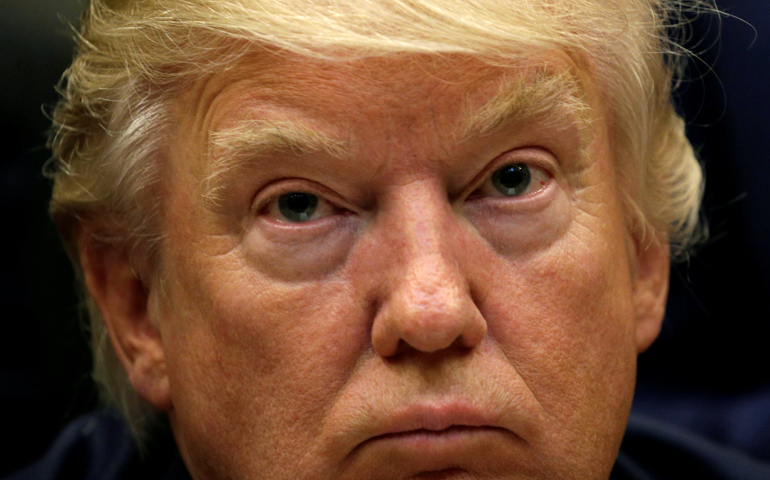
President Donald Trump is seen at the White House in Washington, April 19. (CNS/Kevin Lamarque, Reuters)
Back on April 4 I published a post which asked the question, "When will Donald Trump decide to be president?"
Trump answered that question two days later by sending cruise missiles into Syria after the Syrian regime allegedly used chemical weapons on its own people.
One can argue the merits of this action, but it was presidential. Why? One of the big fears of Trump as president was that he would do something impulsive that could be catastrophic in terms of world order. He didn't. He consulted his advisors. He considered a number of alternatives with which he was presented. He selected the least radical of the options offered. That is what a president does.
Furthermore, on April 5 he removed one of his chief advisors from his position of direct influence on presidential actions. Steve Bannon was a source of disruption and confrontation on every issue.
Just one example was Bannon's work on the health care reform bill, in which he managed to turn off the Republican members of Congress with whom he was supposed to be working.
This confrontational approach was not working well for the president, as he saw his poll numbers slip to a low of 35 percent. I think he finally figured out something was wrong and needed to change. Since the low of 35 percent from March 26-28, he has rebounded to around 40 percent currently.
For approximately the first 75 days of this presidency, we saw nothing but chaos, confrontation and frankly, incompetence. So many things were being said and done in this administration that could be considered "off the wall," that it was difficult to know where to begin one's criticism. There is now evidence that the administration is beginning to get its hands around what governing is all about.
There remain many things to dislike about this president and his administration, but at this point we will have to recognize that criticism will need to be focused on specific issues. From now on any criticism will be directed at someone who actually is the president of the United States.
That makes the task more difficult and in some ways more critical. The Trump administration is working for the rich and powerful. It has essentially declared war on the poor, those who are perceived as different, and the environment.
I don't know why President Trump has moved in this direction. Perhaps he felt this was the best or easiest way to be elected and obtain the power he sought. In any case, he has surrounded himself with a lot of true believers. Although Steve Bannon has been moved to the periphery, people like Attorney General Jeff Sessions, Tom Price, secretary of health and human services, and Scott Pruitt, head of the Environmental Protection Agency, are pretty clear on what their agenda is.
We are seeing harsh immigration enforcement, continued efforts to repeal the Affordable Care Act, and the travel ban. An outline of a tax plan has been presented that will aid the wealthy, provide no relief to those in need, and is expected to raise the deficit and debt by more than a trillion dollars over ten years. It is also disturbing to note that when Republicans raise the deficit, it is often to provide a reason for them to cut other programs designed to help the poor, such as school breakfast and free lunch programs, food stamps, early childhood education, etc.
The Russian connection and innumerable financial conflicts of interest continue to make this president vulnerable. However, with Republicans controlling every part of the government in Washington, how difficult will it be for the truth to come out?
The American people need to be hypervigilant. The most encouraging development during this post-election period has been the activism of the American people. That energy and determination will be critical between now and the 2018 elections.
It must be remembered, however, that we are now dealing with someone who really is the president of the United States. Something has changed at the White House, and while the president is still unpredictable, the administration is more in control of its agenda. President Donald Trump has now become a normal feature of the American scene.
That, in summary, is my assessment of the first 100 days of the Trump presidency. What the next 100 days holds for us is anybody's guess.


